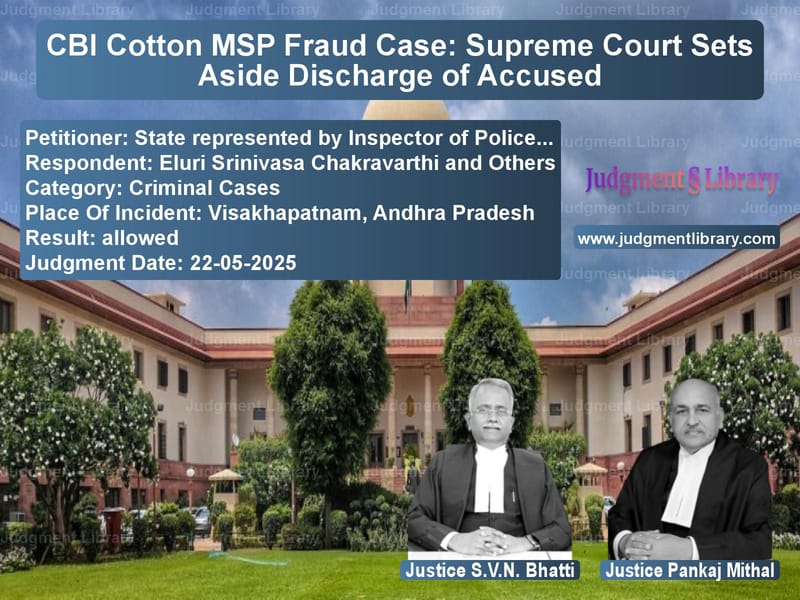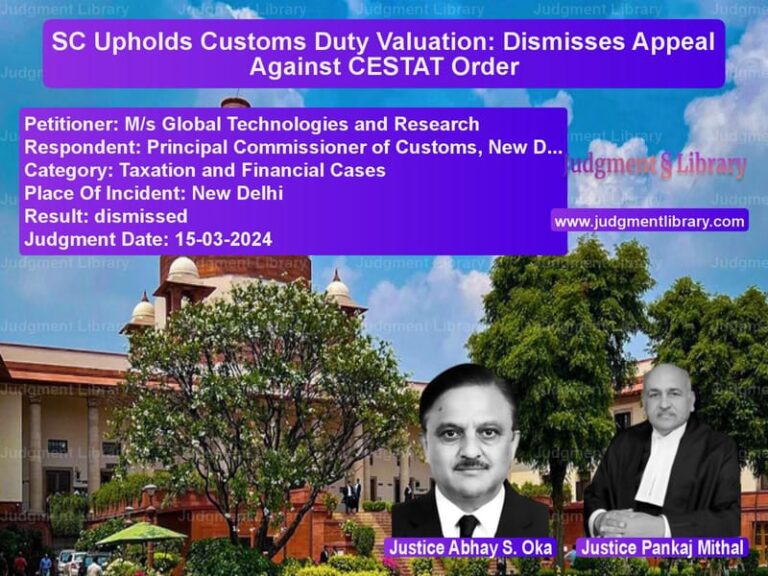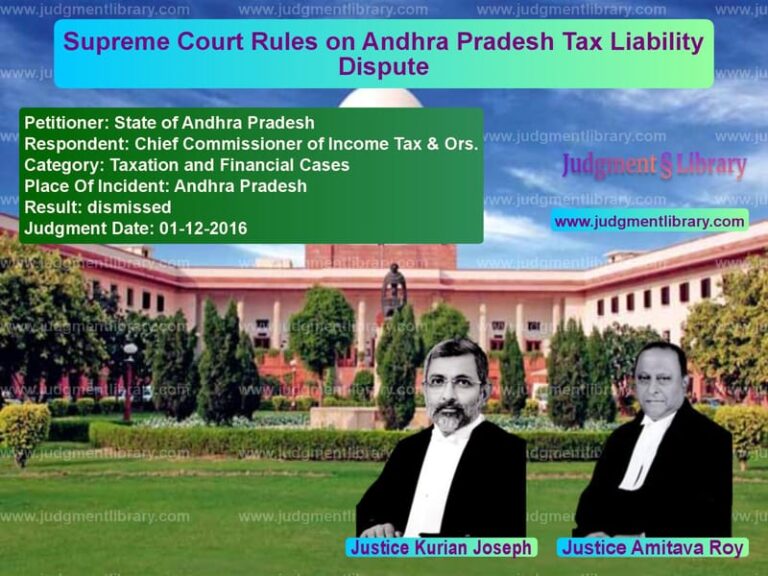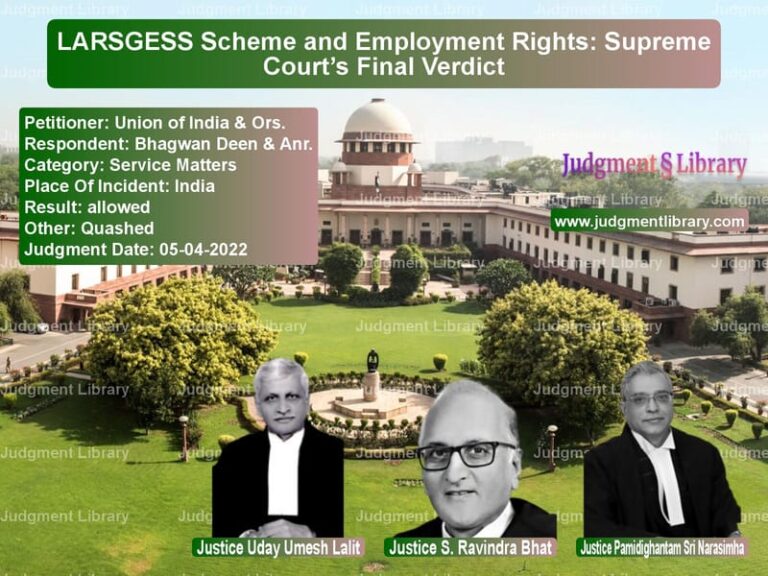CBI Cotton MSP Fraud Case: Supreme Court Sets Aside Discharge of Accused
In a significant ruling that clarifies the legal boundaries of criminal discharge proceedings, the Supreme Court of India recently delivered a judgment that has far-reaching implications for how courts handle complex fraud cases involving public funds. The case involving the State represented by Inspector of Police, CBI, ACB, Visakhapatnam versus Eluri Srinivasa Chakravarthi and Others revolves around an alleged multi-crore rupee fraud in the procurement of cotton under the Minimum Support Price (MSP) scheme, a crucial agricultural support mechanism designed to protect farmers’ interests. This judgment not only addresses the specific allegations of corruption and fraud but also establishes important precedents regarding the procedural aspects of criminal trials, particularly at the discharge stage.
The origins of this complex legal battle date back to June 27, 2006, when the CBI in Visakhapatnam registered an FIR (RC No. 11(A)/2006-CBI/VSP) under sections 120B read with 420 of the Indian Penal Code and sections 13(2) read with 13(1)(d) of the Prevention of Corruption Act, 1988. The case primarily targeted Rayapati Subba Rao (A-1), who served as Cotton Purchase Officer in the Cotton Corporation of India (CCI), Guntur Branch between November 1994 and May 2006. The alleged offences occurred during the financial year 2004-05, a period when the CCI was implementing its MSP policy to purchase cotton from farmers at guaranteed minimum prices to ensure they received fair compensation for their produce.
The CCI had issued clear guidelines through various circulars emphasizing that MSP purchases should be made exclusively from market yards in the presence of Agricultural Market Committee (AMC) representatives. The circulars explicitly stated that “the kapas produce brought directly by farmers only in the market yard be purchased and prices be offered based on the quality of kapas under MSP guidelines so that farmers get due benefit for their produce.” These guidelines were designed to ensure that the benefits of MSP reached genuine farmers and were not diverted to middlemen or traders.
According to the CBI’s investigation, a sophisticated conspiracy was orchestrated by A-1 in collusion with his son, RVK Prasad (A-3), who was the proprietor of M/s Balachamundeswari Cotton Company Limited. The alleged modus operandi involved purchasing cotton from genuine farmers at lower prices before the announcement of MSP by the Government of India, hoarding these stocks, and then reselling them to CCI at the higher MSP rates through benami (fake) farmers. The investigation revealed that A-1, with the support of A-3 and Syed John Syda (A-2), a supervisor at the Agricultural Market Committee in Phirangipuram, executed this scheme across multiple procurement centers in Guntur and Khammam districts.
The scale of the alleged fraud was massive, with the prosecution claiming a wrongful loss of Rs. 21,19,35,646 to the CCI and Government of India. The investigation identified 48 accused persons, including A-4 to A-47 who were allegedly used as benami farmers. Many of these individuals either had insufficient agricultural land to justify the quantities of cotton they supposedly sold or had no cultivable land at all. The CBI’s chargesheet, filed on December 31, 2009, detailed how bank accounts were opened in the names of these farmers, often introduced by A-3 or his employees, through which payments from CCI were routed and subsequently encashed and utilized by the main accused.
The case took a significant turn when the accused filed discharge petitions under Section 239 of the Criminal Procedure Code (CrPC) before the special court. Their primary argument centered around a crucial piece of evidence – a letter dated January 31, 2007, from CCI to CBI, which stated that purchases by A-1 were made as per MSP guidelines, no loss was caused to CCI, no complaints were received from AMC against these purchases, and no objections were raised by statutory auditors. Relying heavily on this communication, the special court allowed the discharge petitions, holding that the material did not create a strong and serious suspicion warranting trial.
The CBI challenged this decision before the High Court of Andhra Pradesh, but the High Court, through its common order dated December 27, 2021, dismissed the criminal revision cases. The High Court affirmed the special court’s view, emphasizing that a judge can sift and weigh evidence to find a prima facie case, justifying a charge only if ‘grave suspicion’ exists. The court held that if only ‘some suspicion’ arises or if two views are equally possible, the accused can be discharged. The High Court found no incorrectness, illegality, or impropriety in the special court’s order discharging the accused, primarily based on the CCI’s exonerating letter.
Read also: https://judgmentlibrary.com/supreme-court-cancels-bail-in-murder-case-land-dispute-turns-deadly/
Aggrieved by this outcome, the CBI approached the Supreme Court through special leave petitions. During the proceedings before the Supreme Court, advocate Ms. Rukhmini Bobde, representing the CBI, presented detailed arguments highlighting the alleged conspiracy and modus operandi. She argued that “the order of discharge does not show as one being compatible with an order of discharge, but sounds like an order of acquittal on merits by appreciating the likely defence of the accused.” She further contended that “the order, both in the procedure stipulated under section 239 of the CrPC and the available ground, i.e., the allegations being groundless, has exceeded its statutory discretionary jurisdiction.”
The CBI counsel emphasized the substantial evidence gathered during investigation, stating that “from the allegations in the chargesheet, read with the accompanying documents, the special court should have examined the prayer for discharge.” She pointed to specific aspects of the case, arguing that “A few of the accused do not have agricultural land, and bank accounts are opened on the same day to receive the MSP. Thus, there is enough intrinsic material warranting a trial.” Most significantly, she stressed that “MSP is meant for the benefit of farmers, and it cannot be syphoned off, and such sурhoning, if proved, amounts to wrongful gain.”
On the other side, Mr. Shoeb Alam, learned senior counsel appearing for the accused respondents, defended the discharge orders. He argued that “the registration of FIR, investigation, and the chargesheet are misappreciated circumstances of the case.” He emphasized that “the accused in the subject criminal appeals are small farmers, and the cotton supplied is not only from the agricultural lands owned by them, and could also be as noticed by the impugned orders, from the agricultural lands taken on lease.” He further contended that “there is no restriction on the source of procurement of cotton, and the statement of A-2 demonstrates that the guidelines have been scrupulously followed.”
Mr. Alam strongly argued that “the special court and the High Court have rightly appreciated the underlying offence for trial, i.e., wrongful gain/loss.” He stressed that “the loss alleged in the purchase of the subject cotton is denied by the CCI, and consequently, there cannot be a trial on these charges except to conduct prosecution as an abuse of the process of law.” Regarding the allegations of forgery and fabrication, he maintained that “the case is without merit” and that “the case does not warrant interference under Article 136 of the Constitution of India.”
The Supreme Court bench comprising Justice S.V.N. Bhatti and Justice Pankaj Mithal carefully examined the rival arguments and the extensive record, which ran into more than a thousand pages. The court identified the core legal issue as whether the special court and High Court had correctly applied the principles governing discharge under Section 239 of CrPC, particularly regarding their reliance on documents produced by the defence.
The Supreme Court made several crucial observations about the legal framework governing discharge proceedings. The court emphasized that “the accused at the stage of framing of charge does not have a right to file material or documents.” Quoting from the landmark decision in State of Orissa v. Debendranath Padhi, the court reiterated that “the record of the case and documents submitted therewith as postulated in Section 227 relate to the case and the documents referred in Section 209. That is the plain meaning of Section 227 read with Section 209 of the Code. No provision in the Code grants to the accused any right to file any material or document at the stage of framing of charge. That right is granted only at the stage of the trial.”
The court further elaborated on the limited scope of judicial scrutiny at the discharge stage, noting that “at Sections 227 and 228 stage the court is required to evaluate the material and documents on record with a view to finding out if the facts emerging therefrom taken at their face value disclose the existence of all the ingredients constituting the alleged offence. The court may, for this limited purpose, sift the evidence as it cannot be expected even at that initial stage to accept all that the prosecution states as gospel truth even if it is opposed to common sense or the broad probabilities of the case.”
The Supreme Court expressed concern about the approach taken by the lower courts, observing that “the passing remark by the High Court in the common order that there is no material for cheating and forgery belies the existence of allegations and documents.” The court clarified that “the consideration of material, i.e., chargesheet and list of documents, in the background of allegations made against the accused is the available path for discharge by the special court and the High Court. But, a path unavailable to the special court and the High Court is the consideration of material invited at the instance of the defence for ordering discharge.”
The court specifically addressed the lower courts’ reliance on the CCI letter dated January 31, 2007, stating that “the orders impugned proceed on the assumption of the absence of loss to the CCI on the basis of the letter dated 31.01.2007.” However, the Supreme Court noted that “the case of prosecution established looks at wrongful gain through conspiracy and forgery to defraud the CCI and the farmers to the tune of Rs.21,19,35,646/-.”
In its concluding remarks, the Supreme Court held that “the procedure followed by the trial court and as confirmed by the High Court is patently illegal, and contrary to the binding precedent.” The court emphasized that “non-compliance with the discretionary limits as set out under section 239 of the CrPC warrants the interference of this Court.”
The Supreme Court’s judgment sets aside the discharge orders and directs the special court to reconsider the matter strictly in accordance with the principles governing Section 239 of CrPC. The court specifically instructed that the special court should exercise its jurisdiction “uninfluenced by any of the observations made in this Judgment, and decide whether a case for discharge is available or charges are to be framed for trial of the alleged offences.”
This judgment has significant implications for the criminal justice system, particularly in cases involving complex economic offences and corruption. It reaffirms the procedural sanctity of discharge proceedings and prevents accused persons from introducing defence materials at the initial stage of trial. The ruling ensures that prosecutions involving substantial public interest and evidence of systematic fraud are not derailed through procedural technicalities or premature appreciation of defence materials.
For the agricultural sector and MSP implementation mechanisms, this judgment serves as a protective measure against the diversion of benefits meant for genuine farmers. By allowing the case to proceed to trial, the Supreme Court has acknowledged the seriousness of allegations involving the subversion of farmer welfare schemes for private gain. The judgment also reinforces the importance of proper judicial scrutiny at the discharge stage, ensuring that cases with prima facie evidence of criminality are not dismissed without proper consideration of the prosecution’s materials.
The Supreme Court’s intervention in this matter demonstrates the judiciary’s role in maintaining the integrity of criminal proceedings and ensuring that procedural laws are applied correctly. By setting aside the discharge orders and remanding the matter for fresh consideration, the court has balanced the rights of the accused with the interests of justice, ensuring that serious allegations of corruption and fraud are properly examined through the established legal process.
Petitioner Name: State represented by Inspector of Police, CBI, ACB, Visakhapatnam.Respondent Name: Eluri Srinivasa Chakravarthi and Others.Judgment By: Justice S.V.N. Bhatti, Justice Pankaj Mithal.Place Of Incident: Visakhapatnam, Andhra Pradesh.Judgment Date: 22-05-2025.Result: allowed.
Don’t miss out on the full details! Download the complete judgment in PDF format below and gain valuable insights instantly!
Download Judgment: state-represented-by-vs-eluri-srinivasa-chak-supreme-court-of-india-judgment-dated-22-05-2025.pdf
Directly Download Judgment: Directly download this Judgment
See all petitions in Fraud and Forgery
See all petitions in Money Laundering Cases
See all petitions in Extortion and Blackmail
See all petitions in Attempt to Murder Cases
See all petitions in Judgment by S.V.N. Bhatti
See all petitions in Judgment by Pankaj Mithal
See all petitions in allowed
See all petitions in supreme court of India judgments May 2025
See all petitions in 2025 judgments
See all posts in Criminal Cases Category
See all allowed petitions in Criminal Cases Category
See all Dismissed petitions in Criminal Cases Category
See all partially allowed petitions in Criminal Cases Category







